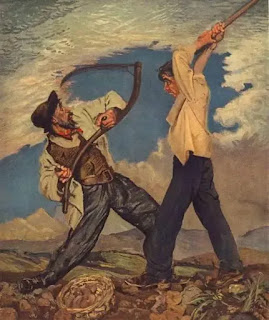The character of Pegeen in The Playboy of the Western World
Synge’s presentation of female characters had caused an uproar from 1903 onwards when the portrait of Nora in In the Shadow of the Glen was “felt to be a slur on Irish womanhood” (T.R. Henn: Introduction to The Complete Plays). Pegeen Mike is hardly the ‘respectable and likable country girl’ that William Fay begged Synge to create. At the outset, there is no question that J.M. Synge wants us to see Pegeen as smart, brave, wily, sharp-tongued, and self-possessed. She finds in Christy a match to her own violent inner passions, passions that might burst the confines of her stifling, island life. Christy’s tale of patricide- a wildly unnatural act, unbounded by conventional morality-inspires her imagination. She contrives a plan to seduce Christy into proposing to her, proving to be a woman of considerable intelligence.
When Christy’s tale is revealed to be false, however, she turns immediately on him, arguably from fear of being ridiculed by her peers. She does not recognize the passions she shares with Christy any longer but instead lets herself be defined by village expectations. In this way, she is more like Shawn than Christy. She ignores Christy’s insistence that he did believe he had killed his father, and hence loses sight of the fact that fantasy and storytelling are as important as the action itself.
Like many other villagers, Pegeen ironically bases her admiration for Christy entirely upon the “valorous” idea of patricide, which, we learn, has only actually occurred through words. The link between words and action is of great importance in The Playboy since Christy becomes the hero he describes only after describing it and then endeavoring to become it. This is one of the focal points at which Christy discovers the power of language: Pegeen describes him as one of “the poets” to reveal that his language can in itself mark him as a hero. Eventually, Christy will fulfill Pegeen’s poetic image of him, and even transcend it by the play’s end.
